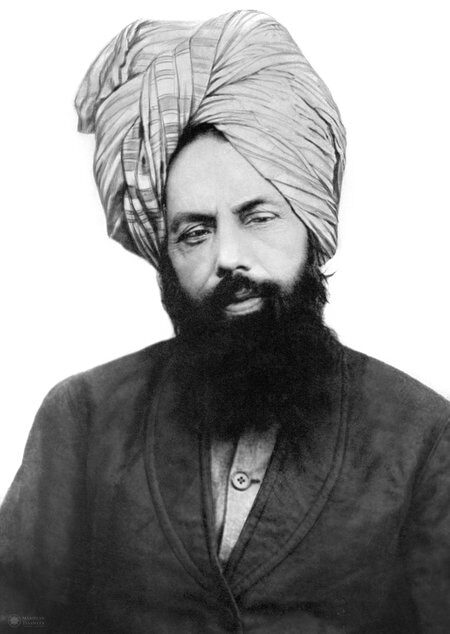Shedding light on the claim of Hazrat Mirza Ghulam Ahmadas with regard to his knowledge of the Arabic language, this series of articles seeks to answer major allegations raised against the Promised Messiah’sas use of Arabic phrases, his God-given eloquence and his command over the language and the usage of sentences taken from past literature.
Muhammad Tahir Nadeem, Central Arabic Desk
It is divine providence that from time to time, objections are raised by opponents, which enable members of the Ahmadiyya Jamaat to research and reflect on the matter and ultimately gain access to the vast ocean of knowledge and insightful points of wisdom hidden beneath these objections, waiting to be uncovered.
The following statement of the Promised Messiahas about the opponents still proves true:
“These allegations are objections in the view of the unwise and those who are foolish. However, I truthfully say that where I have counted these allegations, I have also reflected and found that in reality, many distinct truths can be discovered at the point of these very allegations, but they cannot be seen by those who raise these objections due to their lack of insight. Truly, it is the wisdom of God Almighty that wherever a blinded critic has raised an objection, it is there that a hidden treasure of verities and divine insights lie to be discovered.” (Malfuzat [English], Vol. 1, p. 59)

All crucial objections are refuted by the points and arguments mentioned in the books of the Promised Messiahas. In addition to the past objections, if the claim of the Promised Messiahas about the Arabic language is rightly understood and presented in a comprehensive manner, it is also easier to respond to new objections as well.
A new objection about learning Arabic
A new objection is that the Promised Messiahas wrote an introductory note of about one and a half pages in Arabic at the start of his book, Barahin-e-Ahmadiyya. After reading it, some hasty opponents suggest that the announcement of learning Arabic from God Almighty was made many years after the time of Barahin-e-Ahmadiyya, but the note shows that the founder of Ahmadiyya Jamaat already knew good Arabic, so the announcement of learning Arabic directly from God was, God forbid, false.
On the one hand, opponents object that all his writings were mere plagiarism and on the other, there is this objection that the Promised Messiahas knew good Arabic even before his claim. This allegation is similar to the objection made by some opponents in the time of the Promised Messiahas when they first accused him of plagiarism and at the same time objected that these books were written by Syrians and Arabs.
The Arabic language which the Promised Messiahas knew before he was taught Arabic by Allah the Almighty was the same as that which was taught in madrasas [schools] of his time. At that time, books of sarf wa nahw [principles of grammar], parts of Diwan-e-Hamasa, Diwan-e-Mutanabbi, the seven Mu‘allaqat and some chapters of Maqamat al-Hariri were taught in madrasas and this continues to be the case even today.
If someone could have written powerful and expressive books in Arabic by studying the said course, then it was studied by every cleric at that time. So why was it that not even a single scholar found the courage to compete in that era by writing eloquent Arabic books and accepting the challenge of the Promised Messiahas?
Regarding the Arabic language which is being objected to, the Promised Messiahas himself said that he already knew basic Arabic but it could, in no way, be considered as proficiency in Arabic. (Najm-ul-Huda, Ruhani Khazain, Vol. 14, pp. 107-113)

The claim of the Promised Messiahas was that he was divinely granted proficiency in Arabic and taught lughaat, proverbs, unique usages and styles of the Arabic language. However, the common understanding of basic Arabic language has nothing to do with the said claim of the Promised Messiahas, because it is not within the power of anyone to gain such knowledge of the Arabic language through his own efforts, which can only be acquired by a prophet of God, according to Imam Shafi‘irh.
In short, no matter how good his Arabic language was before his claim, it has nothing to do with the divinely taught Arabic the Promised Messiahas was granted by way of revelation. This miraculous excellence is clearly manifested in the Arabic works of the Promised Messiahas and owing to his God-gifted proficiency, he consistently invited his opponents to hold Arabic contests so that the truth may reveal itself.
In the same way as the above objection, some diligent opponents took every sentence from the Arabic books of the Promised Messiahas and matched them with the phrases of different books of Arabic literature and wherever one or two words of any of his Arabic sentences were found to coincidently correspond with them, they immediately alleged that the said sentence had been plagiarised from such and such Arabic book.
Consequently, the impression given is as if the Promised Messiahas would sit in a room and open 52 Maqamat of Badi Al-Zaman Al-Hamadhani, 50 Maqamat of Abu Muhammad Al-Qasim Al-Hariri, all the poems of seven Mu‘allaqat, all the qasa‘id of Hamasa and other literary books of Arabic; he would then take one sentence from one book and another from a different one, sometimes from the seven Mu‘allaqat, sometimes from Hamasa and sometimes from another book; he would take notes of impressive words, styles and phrases, and at the end, would combine these sentences in the form of a book and publish it. Of course, one can easily understand that such Arabic books cannot be compiled in this way and later be presented as a challenge before the opponents.
Nowadays, softwares are available that contain thousands of books and in just a few seconds, all the books can be searched for a word, or a phrase, or a topic. However, more than a hundred years ago, it was impossible to even think about such a facility.
On the other hand, let us suppose that the Promised Messiahas used to write books in the said way; then this opportunity was also available to the opponents, so why didn’t they dare to compete with the Promised Messiahas? Or if it was difficult for them at that time, then what about today – why are the present-day opponents unable to write such Arabic books in this age when countless Arabic books are available in one software and a search of impressive phrases and words happens with the click of a button, in a matter of seconds.
Moreover, those who are actual writers can understand very well that the scope of plagiarism in research work on a particular subject is very narrow. If you are going to write on a specific subject, you will have to leave out a number of words and phrases to maintain the flow of the subject matter, regardless of how good they may be, because the only thing that can be used to express that very subject in the best possible way are only those particular phrases which are used by the writer of that work. However, one who focuses more on impressive words and phrases will have to forego the actual idea and the particular subject on which they are writing, as was the case of Hariri.
In addition to all these facts, it is also important to note how much time the Promised Messiahas had for writing. Members of the Ahmadiyya Jamaat, non-Ahmadi Muslims and non-Muslims would visit him on a regular basis. The Promised Messiahas used to spare time for meetings with guests, arrange for their food and accommodation and look after such arrangements. He would also spend time removing doubts and objections by answering questions. The Promised Messiahas would also receive letters from associates and opponents on a regular basis, which would number up to 500 per month. Then, he would write replies to all the letters and sometimes, he would write thorough, comprehensive articles in response to some particular letters. Moreover, he used to read articles written by friends and foes or listen to them from others, as well as compose extensive books in response to the attacks of Christians on Islam.
At times, he would write articles and books in response to objections of Hindus and Arya Samajists and on other occasions, publish announcements for the spread of Islam. Sometimes, he would participate in debates and discussions for the sake of manifesting the truth and had to go on various journeys as well.
We have mentioned only a few from the very many activities of the Promised Messiahas. It is impossible for such a person who is so occupied to find the opportunity to open books and extract sentences from them to compose a proficient book in Arabic. The work of welfare for people was in addition to these religious services. Moreover, the Promised Messiahas managed to do all of the said works while residing in a town where even the basic necessities of daily life were lacking.
When the deniers and opponents were unable to show any parallel to the proficiency and eloquent Arabic knowledge of the Promised Messiahas, at times, they said that such and such work of the founder of the Ahmadiyya Jamaat was full of errors or was written in very weak Arabic. Sometimes, contrary to their own objections, they said that as his books contained very impressive literary phrases and eloquent styles, they must have been written by means of plagiarism and when this argument did not stand, they said that a Syrian or an Arab wrote these books for him.
Responding to the above allegations, the Promised Messiahas said:
“My opponents are certainly rightful in thinking that this is not my work and that someone else secretly helps me. Thus, I solemnly declare that indeed, there is another [Entity] Who helps me, but He is not a human being; rather, He is that Omnipotent and Almighty God at Whose threshold our heads [prostrate].” (Ijaz-ul-Masih, Ruhani Khazain, Vol. 18, p. 2)
In another book, the Promised Messiahas said:
اُنظُرْ إلٰي أقوالهم وتنـاقُضٍ
سَـلَب العنـادُ إصابة الآراء
“Note their statements and the contradictions therein! Their stubborn opposition to me has deprived them of sound judgment.”
طَـورًا إلي عـربٍ عـزَوه وتارة
قالوا كلام فاسد الإمـلاء
“At times, they ascribe my writing to an Arab, while, at other times, they say the writing is faulty in composition.”
هٰذا مِنَ الرّحمٰن يا حزبَ العِدا
لا فِعْل شاميٍٓ ولا رفقـائي
“O troop of adversaries! This is indeed a gift from the Gracious God; neither the work of a Syrian, nor the work of any of my companions.” (Al-Istifta, Ruhani Khazain, Vol. 22, p. 726 [English Translation of Al-Istifta in Haqiqatul Wahi, p. 952])
Hence, the Promised Messiahas was blessed with miraculous Arabic knowledge from the Gracious God and the above answer of the Promised Messiahas leaves no room for further explanation.
(Research conducted by Muhammad Tahir Nadeem Sahib, Arabic Desk UK. Translated by Al Hakam)

